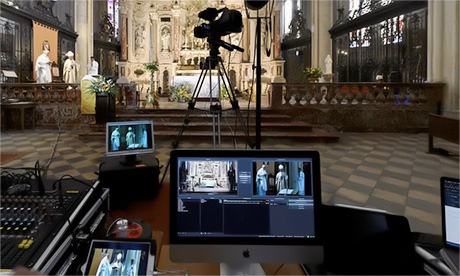The COVID-19 pandemic has disrupted the way most Catholics around the world are used to worshiping, having led to measures ranging from outright bans on physical gatherings to limits on the size and behaviour of congregations.
The various restrictions have raised numerous theological, liturgical and spiritual questions. And the Holy See and the local Churches have urgently tried to provide temporary answers that are in conformity with canon law.
Organizing liturgical services and providing access to the sacraments in ways that adhere to civil laws and respect health measures, has repeatedly strained the Church’s legislative norms.
The Institut Catholique of Paris (ICP) explored the issues during a study day on Nov. 30 that brought together canon lawyers and theologians.
“During the lockdowns, which often coincided with the suspension of services, pastors demonstrated their creativity, especially with Masses broadcast on the Internet,” said Father Ludovic Danto, dean of ICP’s canon law faculty.
“These practices should make us reflect since they raise questions of bringing forth the presence of God and managing what is lacking,” he added.
“The situation we are going through can only be understood within the legal framework of the exception,” Father Danto pointed out.
Technologies that can reinforce self-isolation
The COVID-19 pandemic has posed new challenges to the Church compared to past epidemics.
“Until the 20th Century, the Church saw epidemic scourges as divine punishment for the sins of humanity, while offering people the opportunity to atone and enter into a new covenant with God,” said Father Albert Jacquemin, a lecturer at the ICP.
Has the year 2020 marked the digital transition of ecclesial life?
Such a theology of divine retribution, coupled with limited knowledge of how contamination spreads, led to manifestations of penitential piety.
But the Church has responded to the COVID-19 pandemic in a decidedly more technological manner.
And because of this, Father Cédric Burgunt, vice-head of the ICP canon law faculty, asked, “Has the year 2020 marked the digital transition of ecclesial life?”
“It is for the best that technologies have enabled pastors to reach their people in spite of lockdown,” he noted.
Thanks to the globalisation and digital technology, people are grouping together according to their liturgical and spiritual preferences. People are disregarding territorial structures.
But he worried that these technologies might also be straining the unity of the Christian community in that they tend to accentuate self-segregation among Catholics.
“We are seeing the emergence of new identities which, thanks to the globalization made possible by digital technology, are grouped together according to people’s liturgical and spiritual preferences,” the canonist said.
“They disregard territorial structures, whereas in the past the Catholic faithful had a sense of belonging to the universal Church, first of all through the bell tower of their church,” he pointed out.
Father Burgun warned against the supposedly unifying nature of social media for Catholics.
“We shouldn’t believe that social media creates great encounters, it creates microcosms of like-minded believers,” Father Burgun argued.
“The sacrament trapped in a consumer logic”
Liturgical adaptations, whether they are permitted by digital technology or whether they concern the way one receives the Eucharist (for example, outside of celebrations, or the prohibition of communion on the tongue) must not obscure the fundamental question of how to handle what is lacking for Christians.
The issue was raised by Father Olivier Praud, head for liturgical and sacramental services in the Diocese of Luçon.
He warned of a looming threat.
“Suspending liturgies risks turning the Eucharist into a consumer good and diminishing its significance.
“The sacramental perspective would thus find itself trapped in a consumerist logic,” he explained.
Father Praud supported his hypothesis by pointing to the natural desire Catholics have to try to fill the void left by the suspension of services.
But he said that contradicts the emptiness that fundamentally characterises the liturgy and Christian revelation in general.
“In all Christian theology, emptiness is necessary to allow God to give his grace,” he said.
“In the Old Testament, this is the case for the people of Israel. In the New Testament, the people were waiting for Jesus to save them from Roman oppression,” the priest continued.
“But he moves them and responds to the void in his own way: he saves them from Evil by saying ‘no’ to their immediate satisfaction,” Father Praud explained. “That is, by saying ‘yes’ to their deepest desires.”
- Héloïse de Neuville is a religion journalist. First published in La Croix International.
News category: Analysis and Comment.




